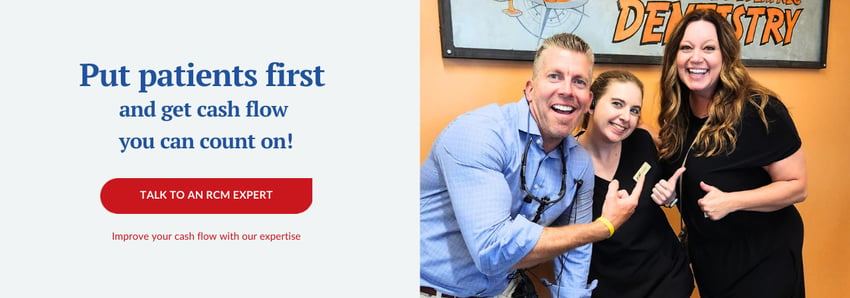How often should practices post dental insurance payments?


Seems like a simple question, but you’re overwhelmed and need answers and recommendations from people that have been there.
At Dental Claim Support, to say we’ve been there is an understatement. Our team of tenured billing experts are all too familiar with the ins and outs of the dental billing process and helping dental offices figure out the best ways to optimize this process.
In this article, we will explain when you should post insurance payments and why posting them in a timely manner brings your practice more money, helping you grow your business.
Why you have to post dental insurance payments
Typically dental offices have a business assistant or insurance coordinator who is in charge of posting payments. Perhaps your entire front office is trained to post payments. Either way, it’s important because it’s one of the final steps in the dental billing process.
After you have sent your claim and insurance has processed it, you then must post the insurance payment in your dental software. Here is why:
- It records the payment in your practice management software. This should match up directly with the day it was deposited in your bank account.
- Posting the claim payment(s) applies a credit to the patient’s ledger. This either leaves a balance owed by the patient that needs to be collected, or hopefully creates a “0 balance”.
- It removes the claim from the insurance aging report as the claim is no longer “outstanding”.
If your claim is outstanding, it means it hasn’t been deposited into your account, in other words: you haven’t collected what you’ve earned. Being paid is what keeps your business alive, so it should be a top priority to post insurance payments.
How often should you post these dental insurance payments to your practice management software?
Our dental billing experts recommend your office post checks within a day of them arriving in the mail and/or being directly deposited in your bank account in order to keep cash flowing.
A 24-hour mail turnaround time is ideal if you are able. Like we mentioned above, it keeps cash constantly flowing, leaves no stone unturned and keeps your billing process organized. Depending on when mail comes in and how many EFTs (Electronic Funds Transfer) you receive, your office should reconcile these payments daily, or by the end of the week. However, we do understand that every office has their own needs and system.
Some practices post payments daily, others might do it two or three days a week, depending on, again, who they have doing what and how many payments there are to be posted. Ideally, you have one person who’s sole responsibility is billing so that someone is always aware of what’s been paid, what’s outstanding and know what needs to be done to get your practice paid by patients and insurance. They should have time to do this daily or every other day. Whether you are posting 2-3 days a week or everyday, make sure you allot the time in your schedule so you can stay focused.
Too often we see dental practices holding checks in the drawer. Literally, we find checks stashed away in drawers more often than you think. We also find hundreds of EFTs not posted. And we have found this in numerous practices. Reason being, Electronic Remittance Advice (ERAs) for EFTs are loaded on a designated website and not physically mailed to the practice, rendering them ‘invisible’ so to speak. This makes them very easy to miss.
The main goal in posting your insurance payments ASAP is to keep everything up-to-date and stay organized, A.K.A., get paid. Posting these payments closes the claim you originally created and sent after the patient’s procedure was finished. It’s kind of like checking things off of your list as complete. When you put things off on your checklist, it becomes more difficult to get them done.
Once you go into your ledger in the dental software, open up the claim, apply the insurance payment (whether it is a physical check or electronic payment), it closes the claim. Doing this not only makes sure you are paid, but keeps your insurance aging report number low. Once a claim is open for 30 days, it is added to your “over 30” insurance aging report. The longer it’s on there, the harder it is to get it paid.
Insurance money is what keeps your dental practice running
We all know money keeps your doors open. For some dental practices specifically, the biggest chunk of cash that’s paying your team’s paycheck, equipment and other bills, is insurance money. In that case, most of your revenue is coming from insurance companies paying your claims, not from patients.
Obviously collecting patient portions is still important, we’re not discounting that. However as we’re sure you have noticed, the check from insurance can be quite a bit larger than that from a patient. That’s the entire point of insurance, right? So that patients don’t have to pay as much. That’s why it’s imperative that you are getting paid by insurance and posting these payments in a timely manner: to keep your practice running.
This can be done by your team through diligent, organized processes and daily postings. Or you can let an outsourced dental billing company handle it for you. Either way, like most things, procrastination is not going to lead to success or a high collections percentage.
How can you efficiently and effectively post insurance payments?
We all know how it feels to have something hanging over your head that you need to get done. When it comes to posting insurance payments, or really anything in the dental billing process, having a designated person responsible for this is key.
Whether it is an in-house team member or outsourced, you are capable of streamlining and organizing your billing process to bring in more money.
To continue your dental billing journey, schedule a call with one of our experts.
Related Posts
Dental revenue resources from Dental Claim Support

